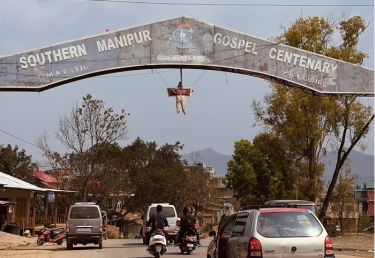
Fresh violence has broken out in Manipur’s volatile border areas, resulting in the death of a Kuki woman and the injury of a Meitei farmer in separate incidents. The events have triggered widespread protests and an indefinite shutdown across tribal regions.
The unrest began on 19 June when armed assailants shot Ningthoujam Biren Singh, a 60-year-old cultivator from Phubala Awang Maning Leikai in Bishnupur district. He was working in his paddy field around 3 p.m. when he was shot in the left arm. He was initially taken to the district hospital before being referred to the Regional Institute of Medical Sciences in Imphal. His condition is reported to be stable.
In response, security forces launched search operations in and around Langchingmanbi, Heichanglok, and the western areas of Phubala village. During the operation, they came under fire from armed miscreants and retaliated.
“During the crossfire, a woman from Langchingmanbi village was found dead with a bullet injury. She was later identified as Hoikholhing Haokip, the wife of the village chief of Langchingmanbi,” police said in a statement. Her body was transported to Churachandpur District Hospital for legal formalities.
The incidents provoked swift and widespread reactions from both communities. Villagers in Phubala condemned the government for failing to protect farmers in the vulnerable “buffer zone” that separates the Meitei-dominated Imphal Valley from the Kuki-Zo majority hill regions. Protesters blocked the highway leading to Churachandpur, demanding action against armed Kuki fighters.
The Indigenous Tribal Leaders’ Forum (ITLF) announced an indefinite shutdown across Churachandpur district and other Kuki-dominated areas. The group denounced the killing as a “brutal and cold-blooded” act and held the state government “directly responsible for allowing such atrocities to unfold under its watch.”
“This heinous act is not an isolated incident. It is yet another targeted assault in what has now become a systematic campaign of state-sponsored ethnic cleansing against the Kuki-Zo minority,” the ITLF said.
By 21 June, Churachandpur town was effectively shut down. Protesters blocked roads, including the key Tiddim Road (NH-150), which connects Imphal with Mizoram. Markets, schools, and government offices were closed, although essential services such as pharmacies and hospitals were allowed to operate.
The Kuki Women’s Organisation for Human Rights called for the immediate arrest and punishment of those responsible, strict enforcement of the buffer zone with equal accountability, deployment of neutral central forces, and a judicial inquiry into the incident and ongoing buffer zone violations.
Meanwhile, the Coordinating Committee on Manipur Integrity (COCOMI) urged the government to deploy security forces across hill and foothill regions bordering the valley’s agricultural zones. “This is the working season. Our farmers must have the right to safely access and cultivate their fields,” a spokesperson said, warning of potential mass agitation.
This is the second violent incident involving farmers along the buffer zone in four days. On 15 June, clashes between Kuki and Meitei villagers on the Imphal East–Kangpokpi border had already heightened tensions.
Such attacks on farmers became common after ethnic conflict erupted between the Meitei and Kuki-Zo communities on 3 May 2023. Although violence had subsided following the imposition of President’s Rule on 13 February, the ongoing conflict has claimed over 250 lives and displaced around 60,000 people.
Police have registered cases in relation to both incidents and launched investigations. “Combined security forces are continuing search operations to identify and apprehend the culprit(s). Every effort is being made to bring those responsible to justice as quickly as possible,” a police statement said.
Additional state and central forces have been deployed to maintain order, as tensions remain high across the region.




